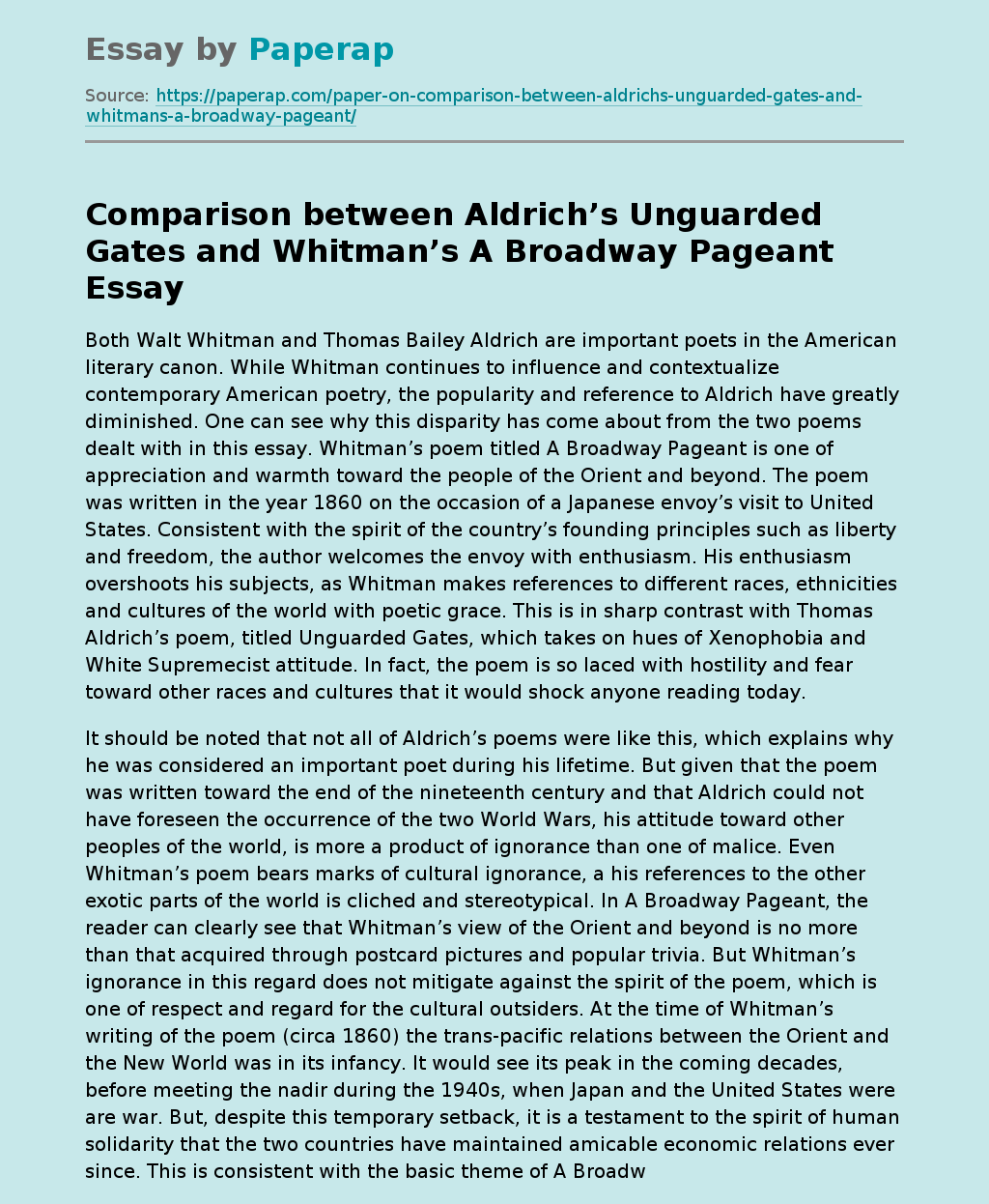Comparison between Aldrich’s Unguarded Gates and Whitman’s A Broadway Pageant
Both Walt Whitman and Thomas Bailey Aldrich are important poets in the American literary canon. While Whitman continues to influence and contextualize contemporary American poetry, the popularity and reference to Aldrich have greatly diminished. One can see why this disparity has come about from the two poems dealt with in this essay. Whitman’s poem titled A Broadway Pageant is one of appreciation and warmth toward the people of the Orient and beyond. The poem was written in the year 1860 on the occasion of a Japanese envoy’s visit to United States.
Consistent with the spirit of the country’s founding principles such as liberty and freedom, the author welcomes the envoy with enthusiasm. His enthusiasm overshoots his subjects, as Whitman makes references to different races, ethnicities and cultures of the world with poetic grace. This is in sharp contrast with Thomas Aldrich’s poem, titled Unguarded Gates, which takes on hues of Xenophobia and White Supremecist attitude. In fact, the poem is so laced with hostility and fear toward other races and cultures that it would shock anyone reading today.
It should be noted that not all of Aldrich’s poems were like this, which explains why he was considered an important poet during his lifetime. But given that the poem was written toward the end of the nineteenth century and that Aldrich could not have foreseen the occurrence of the two World Wars, his attitude toward other peoples of the world, is more a product of ignorance than one of malice.
Even Whitman’s poem bears marks of cultural ignorance, a his references to the other exotic parts of the world is cliched and stereotypical. In A Broadway Pageant, the reader can clearly see that Whitman’s view of the Orient and beyond is no more than that acquired through postcard pictures and popular trivia. But Whitman’s ignorance in this regard does not mitigate against the spirit of the poem, which is one of respect and regard for the cultural outsiders. At the time of Whitman’s writing of the poem (circa 1860) the trans-pacific relations between the Orient and the New World was in its infancy. It would see its peak in the coming decades, before meeting the nadir during the 1940s, when Japan and the United States were are war. But, despite this temporary setback, it is a testament to the spirit of human solidarity that the two countries have maintained amicable economic relations ever since. This is consistent with the basic theme of A Broadway Pageant.
Considering the times we live in, with the phenomenon of economic globalization playing an important role, A Broadway Pageant continues to remain relevant to political and social discourse. But unfortunately, the same cannot be said of Unguarded Gates, which would only antagonize and offend the millions of illegal immigrants living in the United States. Whether a select White minority like it or not, it is a reality today that the American economy depends heavily on goods imported from developing regions of the world, especially in Asia. The Unguarded Gates’ strong statements against immigration is also blatantly against the principles upon which the nation was founded. Aldrich seems to have forgotten that the United States had always been a nation of immigrants ever since its discovery by Christopher Columbus. Even on technical grounds, Whitman’s poem scores over Aldrich’s. Whitman incorporates a range of poetic tools in getting his point across to the reader and succeeds in making it aesthetically wholesome. The references to particular cultural symbols is also masterfully carried out. Whitman’s poem does not conform to standard poetic metrics, but still retains pace and rhythm.
Both Walt Whitman and Thomas Bailey Aldrich are important poets in the American literary canon. While Whitman continues to influence and contextualize contemporary American poetry, the popularity and reference to Aldrich have greatly diminished. One can see why this disparity has come about from the two poems dealt with in this essay. Whitman’s poem titled A Broadway Pageant is one of appreciation and warmth toward the people of the Orient and beyond. The poem was written in the year 1860 on the occasion of a Japanese envoy’s visit to United States. Consistent with the spirit of the country’s founding principles such as liberty and freedom, the author welcomes the envoy with enthusiasm. His enthusiasm overshoots his subjects, as Whitman makes references to different races, ethnicities and cultures of the world with poetic grace. This is in sharp contrast with Thomas Aldrich’s poem, titled Unguarded Gates, which takes on hues of Xenophobia and White .
Comparison between Aldrich’s Unguarded Gates and Whitman’s A Broadway Pageant. (2019, Feb 16). Retrieved from https://paperap.com/paper-on-comparison-between-aldrichs-unguarded-gates-and-whitmans-a-broadway-pageant/

